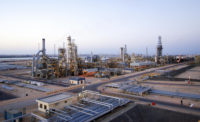
Africa is poised to expand its crude refining capacity by an additional 1.6 million barrels per day when refinery projects underway in four countries are completed and operating.
Despite competition from cheap fuel imports, viability questions related to small regional refinery projects and unreliable crude-oil supply, Algeria, Nigeria, South Africa and Uganda are proceeding with plans to increase their crude refining capacities to wean themselves off reliance on imports.
Algeria’s state-owned oil firm Sonatrach Petroleum has ongoing upgrade projects at three refineries to add 82,000 barrels per day to their combined capacity. It hopes to complete the first phase of the plan by year-end, when work at its Algiers refinery is finished under a $908-million contract awarded in 2010 to Paris-based Technip.
The project, which will expand its capacity to 332,000 barrels per day, “will allow the refinery to produce gasoline at specifications similar to those in force in Europe,” says Technip on its website. Upgrades also are anticipated through 2018 at six other refineries, says Sonatrach on its website.
Algeria, which exports up to 85% of its crude to Europe and the U.S., has 12.2 billion barrels of proven onshore oil reserves but produces an average of 1.9 million barrels per day.
New capacities also are expected in Nigeria, where the Lagos-based Dangote Group has finalized plans to build a new 400,000-bbd-refinery in the Lekki Free Trade Zone, near the commercial capital of Lagos.
Dangote, which is the largest manufacturing conglomerate in western Africa, has awarded to Engineers India Ltd. (EIL) a $139-million contract for engineering, procurement and construction management for the refinery and a polypropylene plant that is said to involve up to $9 billion in investment.
Dangote plans to contribute $3.5 billion to the project, seek $ 2.2 billion from export credit agencies and development funds, and finance the remainder with loans from international and local banks, according to reports.
Nigeria, which has an estimated estimated 37.2 billion barrels of proven crude-oil reserves, currently has four refineries, but they frequently are plagued by operational failures and disruption of crude supply because of pipeline sabotage.
In Uganda, the government has short-listed four international firms—China's Petroleum Pipeline Bureau, South Korea’s SK Group, Russia’s RT Global Resources and Japan’s Marubeni Corp.—for a planned two-phase, 60,000-bbd refinery at Hoima, near the Lake Albert rift basin.
It will be supplied with crude from oil fields operated by London-based Tullow Oil, France’s Total SA and the state-owned China National Offshore Oil Corp. (CNOOC).
The ministry of energy prequalified the four bidders for the $2.5-billion cracking oil refinery and 205-km pipelines after a project feasibility study by Foster Wheeler.
Uganda plans to develop the refinery under a public-private-partnership model, under which the 40% government stake will be shared between the governments of Uganda, Kenya and Rwanda.
South Africa, which has, after Egypt, the second-largest crude distillation capacity in Africa, is pushing for a final investment decision on the proposed 400,000-bbd Mthombo refinery, which will be developed by state firm PetroSA in partnership with Beijing-based Sinopec and South Africa’s Industrial Development Corp.
The project, if constructed, would be the first refinery in South Africa to comply with new, tighter fuel standards by 2017. The mandate also could generate needed upgrades at four existing refineries.
The refinery upgrade is to ensure South Africa’s fuels meet European clean-fuel standards. It has estimated crude-oil reserves of 15 million barrels per day but produced only 180,000 bbd last year. South Africa relies on synthetic fuels from coal and natural gas for up to 90% of its domestic petroleum supply.
A decision is yet to be made on when the Project Mthomo will break ground.


